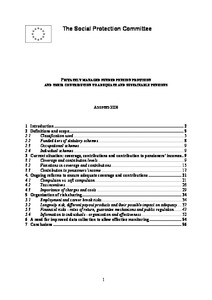Privately managed funded pension provision and their contribution to adequate and sustainable pensions
"One of the main achievements of social policies in the second half of the last century is that being old is no longer synonymous with being poor or being dependent on the support of one's children. This success has mainly been achieved through the provision of public pensions. While recog...
| Institution: | ETUI-European Trade Union Institute |
|---|---|
| Format: | TEXT |
| Language: | English |
| Published: |
Brussels
2008
European Commission |
| Subjects: | |
| Online Access: | https://www.labourline.org/KENTIKA-19180806124919080889-Privately-managed-funded-pensi.htm |
| Summary: | "One of the main achievements of social policies in the second half of the last century is that being old is no longer synonymous with being poor or being dependent on the support of one's children. This success has mainly been achieved through the provision of public pensions.
While recognising the achievements of pension systems, the current challenges of the ageing populations, in particular the financial strains on pension systems, call for urgent action. The Commission’s first annual progress report of the Growth and Jobs Strategy (January 2006) identifies responding to globalisation and ageing, and in particular reforming of public pension systems, as one of the main actions to be undertaken in Europe.
The European Union is addressing the issue by enhancing dialogue and cooperation between Member States on issues related to the reform of pension systems.
The 2003 Joint Report on Pensions underlined the interdependency between the financial sustainability and adequacy of pensions in the context of ageing societies and the need for comprehensive reforms with the aim of securing adequate, accessible and financially sustainable pension systems. In particular, the Joint Report called on Member States to improve incentives for older workers to remain longer in the labour market, to strengthen the link between contributions and benefits and to increase public and private funding, especially in light of the long-term implications for pension expenditures of increased life expectancy.
Substantial progress has been achieved since then. Member States continue to report on reforms to their pension systems in the context of the national reform programmes, assessed in the Commission's annual progress report.
* Disincentives to work longer have been reduced and incentives strengthened, links between contributions and benefits have been tightened and life expectancy has been further taken into account in pension systems.
* Moreover, the provision of supplementary pensions has been promoted and legislative frameworks improved. Furthermore, some Member States have also tackled old age poverty by increasing the levels of guaranteed minimum pensions.
* Reforms have made steps regarding all three key objectives: providing adequate retirement income, ensuring financial sustainability and adapting systems to changing labour market and societal conditions.
These are some of the measures supported through the coordination of national policies for growth and jobs and the Open Method of Coordination on Social Protection and Social Inclusion." |
|---|---|
| Physical Description: | 58 p. Digital |

